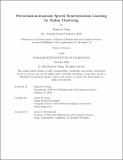Perturbation-invariant Speech Representation Learning by Online Clustering
Author(s)
Chang, Heng-Jui
DownloadThesis PDF (4.099Mb)
Advisor
Glass, James R.
Terms of use
Metadata
Show full item recordAbstract
Despite success across various tasks, self-supervised speech models face significant challenges in enhancing content-related performance with unlabeled data, requiring substantial computational resources. Meanwhile, learning from clustered discrete units has been shown to facilitate accurate phonetic representations. Thus, this thesis investigates speaker and noise-invariant speech representations. First, Speaker-invariant Clustering (Spin) is proposed to extract content representations through online clustering and speaker-invariant cross-view prediction. Second, Robust Spin (R-Spin) is devised to extend Spin to handle more distorted speech signals by leveraging acoustic pieces. Furthermore, this thesis includes a diverse set of evaluation and visualization techniques to quantitatively and qualitatively analyze the perturbation invariability of the proposed methods. This thesis offers approaches to producing perturbation-invariant speech representations and deeply investigates the characteristics of the learned representations, providing insights into these models and cultivating future extension possibilities.
Date issued
2024-02Department
Massachusetts Institute of Technology. Department of Electrical Engineering and Computer SciencePublisher
Massachusetts Institute of Technology